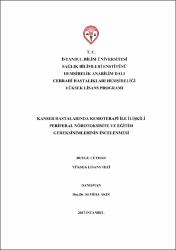Kanser hastalarında kemoterapi ile ilişkili periferal nörotoksisite ve eğitim gereksinimlerinin incelenmesi.
Künye
Ceyhan D. (2017). Kanser hastalarında kemoterapi ile ilişkili periferal nörotoksisite ve eğitim gereksinimlerinin incelenmesi. Yayımlanmamış yüksek lisans tezi. İstanbul: İstanbul Bilim Üniversitesi, Sağlık Bilimleri Enstitüsü.Özet
Amaç: Bu araştırma kanser hastalarında kemoterapi ile ilişkili periferal nörotoksisite semptomlarını ve periferal nörotoksisite semptomlarının kontrolüne ilişkin hastaların eğitim gereksinimlerinin değerlendirilmesi amacıyla gerçekleştirildi.
Gereç ve Yöntem: Bu çalışma tanımlayıcı nitelikte bir araştırmadır. Araştırma örneklemini, kemoterapi alan 150 kanser hastası oluşturdu. Veriler Amerikan Ulusal Kanser Enstitüsü Ortak Toksisite Kriterleri ve Periferal Nörotoksisite ve Eğitim Gereksinimlerini Değerlendirme Formu’yla toplandı.
Bulgular: Hastaların yaş ortalaması 55,06 ± 11,86, %35,3'ü gastrointestinal kanser hastası, %42,7'si ise meme kanseri hastasıdır. Örneklemin %32,7’si nörotoksik etkili kemoterapötik ilaçlar (taksanlar, oksaliplatin sisplatin, karboplatin) kullanmaktadır. Hastaların hafif düzeyde (grad 1) nevralji (%42,7), parestezi (%48,7), dizestezi (%24,7), periferal motor nöropati (%10) ve periferal duyusal nöropati (%0,7) şikayetleri yaşadıkları belirlendi. Örneklemin küçük bir bölümü “orta ve şiddetli” (grad 2 ve 3) düzeyde nevralji (%8), parestezi (%7,3), dizestezi (%5,3), periferal motor nöropati (%15,3) ve duyusal nöropati (%20) şikayetleri bildirdi. Hastaların %54,7'si el veya ayak parmaklarındaki ağrı veya uyuşma şikayetleriyle baş etmeye yönelik parmak uçlarını soğuktan koruduklarını, %53,3'ü buzdolabı veya dondurucu gibi soğuk nesnelere dokunmadıklarını, %74'ü hekim önerisiyle ağrı kesici ilaç kullandıklarını bildirdi.
Sonuç: Bulgular hastaların farklı derecede periferal nörotoksisite şikayetleri yaşadıklarını, duyusal ve hastaların motor semptomlarının günlük yaşamı üzerindeki etkileriyle baş etmek konusunda desteğe ihtiyacı olduğunu göstermektedir. Objective: The study was conducted to evaluate the chemotherapy-ınduced peripheral neurotoxicity symptoms in cancer patients, and the education needs for the management of peripheral neurotoxicity symptoms.
Materials and Methods: This study is a descriptive research. The study sample consisted of 150 cancer patients receiving chemotherapy. Data was gathered using Toxicity Criteria of American National Cancer Institute-Common Terminology Criteria for Adverse Events and Peripheral Neurotoxicity and Education Needs Evaluation Form.
Results: The mean age of patients was 55.06 ± 11.86. Patients were diagnosed with gastrointestinal cancers (35.3%) and breast cancer (42.7%). Sample (32.7%) received chemotherapy agents with neurotoxic effects (taxanes, cisplatin, oxaliplatin, carboplatin). The patients suffered from mild (grade 1) neuralgia (42.7%), paresthesia (48.7%), dysesthesia (24.7%), peripheral motor neuropathy (10%) and peripheral sensory neuropathy (0.7%) complaints. A small portion of the sample suffered from “moderate to severe” grade (grade 2 and 3) of neuralgia (8%), paresthesia (7.3%), dysesthesia (5.3%), peripheral motor (15.3%) and sensory neuropathy associated complaints (20%). More than half of patients (54.7%) reported to protect their finger or toe tips from cold to cope with pain and numbness thereof to keep the fingers warm; avoided touching cold objects (53.3%) such as refrigerators or freezers; and 74% used painkillers recommended by physicians.
Conclusion: The findings indicated that patients experienced different degrees of peripheral neurotoxicity symptoms, and needed support in coping with the effects of sensory and motor neurotoxicity symptoms on patients' daily life


















